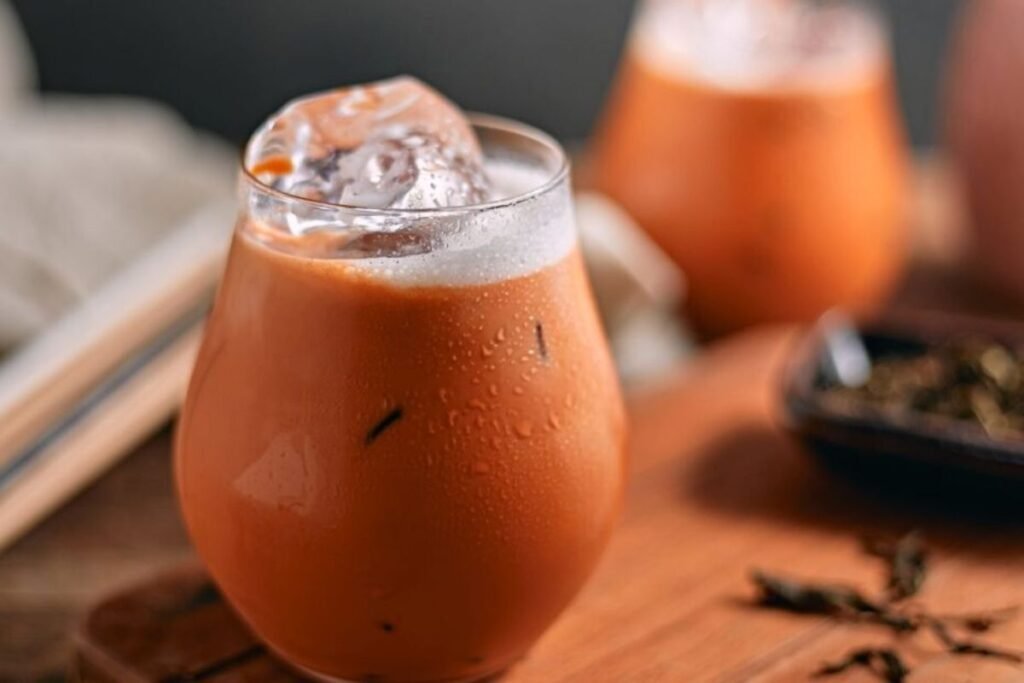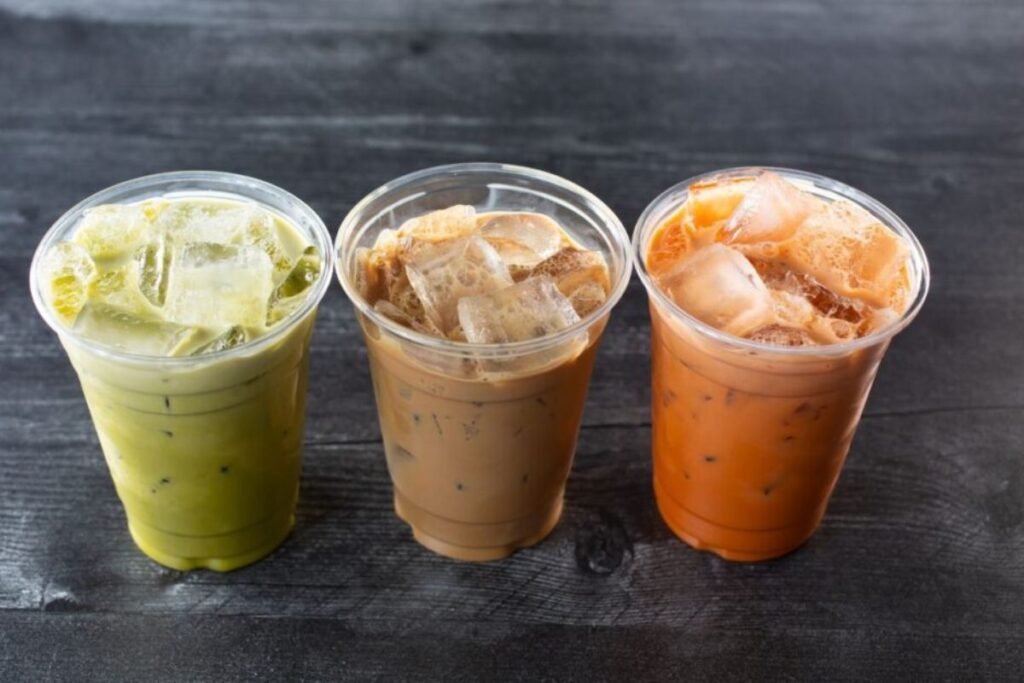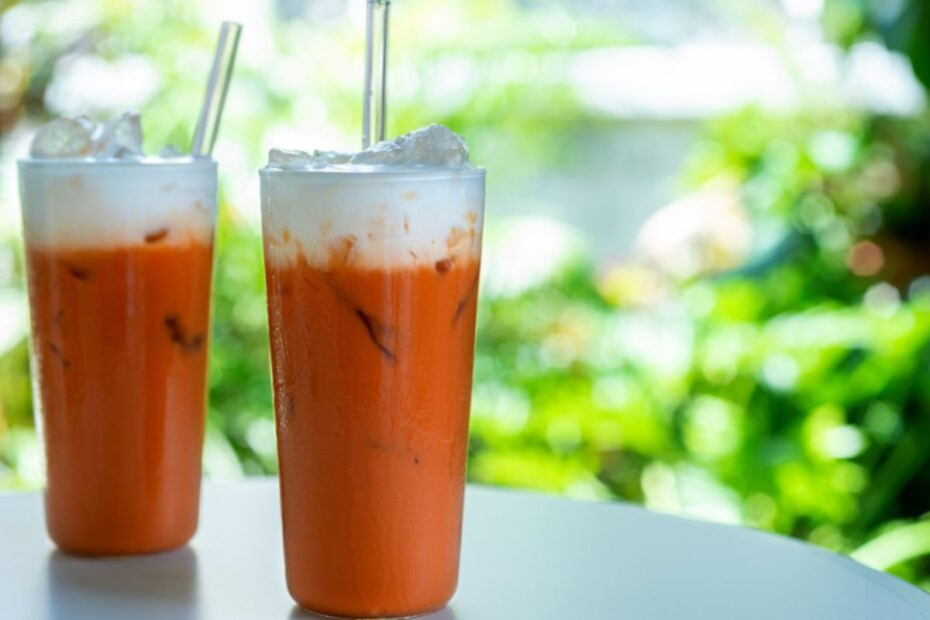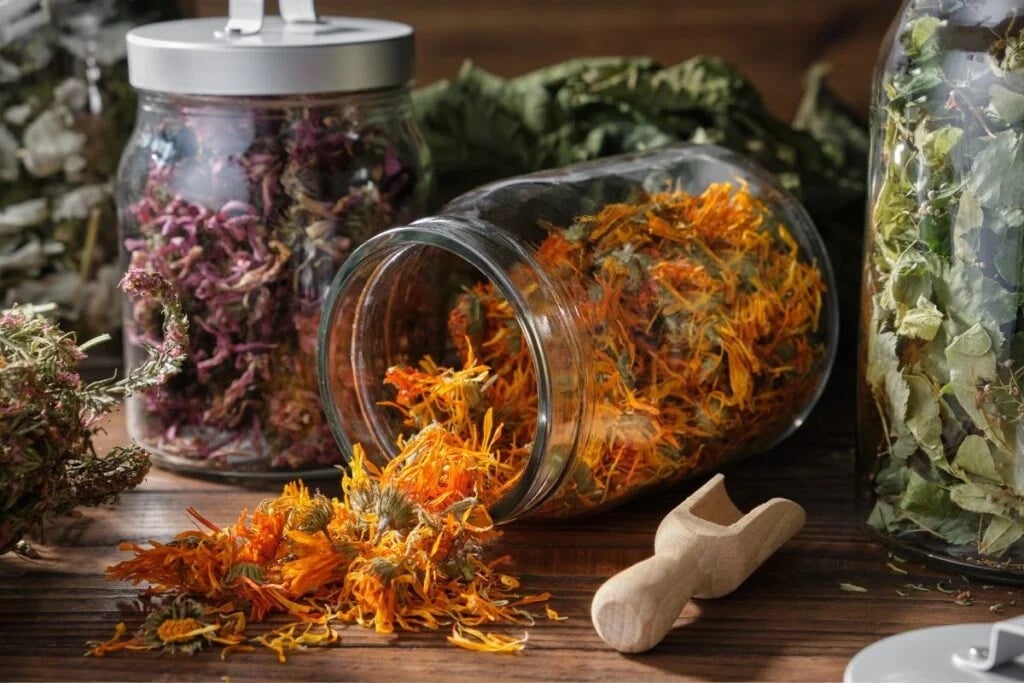Thai tea is more than just a refreshing and flavorful beverage; it is a cultural phenomenon that has won hearts worldwide. With its distinctive orange hue and rich, creamy flavor, this beloved drink, originally served on the streets of Thailand, has become a favorite in countries throughout Asia, as well as in Europe and North America. Its unforgettable taste comes from a blend of bold black tea, smooth milk, and a touch of exotic spice, creating a sensory experience unlike any other. What are the Thai tea benefits?
But the global appeal of Thai tea isn’t solely due to its taste. Rich in antioxidants, it can provide an energy boost and support overall well-being. Still, as with any beverage known for its unique properties, enjoying Thai tea wisely requires a bit of knowledge, both in terms of proper preparation and understanding its potential health effects.
What Exactly Is Thai Tea?
Called cha yen (ชาเย็น) in Thai, Thai tea is a classic beverage prepared from robustly brewed Ceylon black tea, sweetened with sugar and finished with milk. While authentic Thai tea typically doesn’t include spices, many international versions incorporate ingredients like star anise or cardamom to enhance the flavor.
This drink enjoys immense popularity across Southeast Asia and is a staple offering in Thai restaurants worldwide. When served over ice, it’s referred to as cha yen (iced tea), while the hot version is called cha ron (hot tea). The signature orange color comes from food coloring added during tea leaf processing—a visual element that has become emblematic of Thai tea itself.
Thai tea has its roots in the late 19th century, when tea was first brought to Thailand during the reign of King Rama V. The now-famous milky variation likely emerged in the mid-20th century, around the time when Field Marshal Plaek Phibunsongkhram encouraged the adoption of Western habits.
Another theory suggests that Thai tea was born from everyday practicality: in the 19th century, when British and other foreign traders brought tea to Thailand, local workers would brew tea for the foreigners, then reuse the steeped leaves to prepare a second, milder infusion for themselves.

Ingredients of Thai Tea
Authentic Thai tea is crafted from a handful of key ingredients that, together, create its unforgettable flavor profile. At its core is Ceylon black tea, known for its rich, bold taste and deep color. This strong tea base is often enhanced with natural spices such as star anise, cardamom, cinnamon, cloves, and vanilla, each contributing subtle aromatic notes that add depth and complexity.
The signature orange hue of Thai tea originates from a mix of natural and artificial colorants. Traditionally, safflower oil (Carthamus tinctorius) was used to impart a soft, warm orange tint. In modern blends, food-grade yellow and red dyes are often added to achieve the vibrant, eye-catching color now associated with the drink.
Milk is another versatile component of Thai tea. Depending on the recipe or preference, it can be made with sweetened condensed milk, fresh milk, evaporated milk, or coconut milk, or served dairy-free altogether. Condensed milk is especially popular, as it lends the tea a creamy texture and distinct sweetness. Sugar is typically added as well, and the level of sweetness can be adjusted to suit personal taste.
Popular pre-blended Thai tea mixes, such as ChaTraMue or Number One Brand, conveniently contain tea, spices, and coloring, making it easy to prepare authentic Thai tea at home with minimal effort.
Health Benefits of Thai Tea
Since Thai tea is based on black tea, it inherits health-promoting properties. While people see this beverage as a sweet treat, it can offer genuine wellness benefits, especially when consumed mindfully.
Rich in Antioxidants: Black tea has beneficial compounds: polyphenols, theaflavins, and thearubigins, which help neutralize free radicals and reduce oxidative stress in the body. These antioxidants contribute to overall cellular health and may help lower the risk of chronic disease.
Boosts Energy and Focus: One of Thai tea’s most noticeable effects is its ability to enhance alertness. A standard 240 ml (8 oz) serving contains around 47–60 mg of caffeine, roughly half the amount found in a cup of coffee. This moderate level provides a mild energy boost without causing the jitters. Moreover, black tea contains L-theanine, an amino acid that promotes calm, focused energy. Caffeine and L-theanine create a balanced state of alertness, ideal for productivity and mental sharpness.
Supports Heart Health: Black tea is a source of flavonoids, which improve cardiovascular function. Regular consumption may help lower blood pressure, reduce LDL (bad) cholesterol, and enhance blood vessel function. These effects make Thai tea, in its less sweetened forms, a heart-friendly beverage when enjoyed as part of a balanced lifestyle.
Aids Metabolism and Weight Management: The polyphenols in black tea may help boost metabolic rate and reduce fat absorption, offering support for weight management. While traditional Thai tea can be high in sugar, reducing the sweetener or opting for sugar substitutes can make it a lighter, healthier option.
Promotes Healthy Digestion: Indigenous people used the spices used in Thai tea, especially star anise and cardamom, to support digestive health. These spices may stimulate digestive enzymes, ease bloating, and help relieve feelings of fullness after a heavy meal.

Thai Tea Flavor and Aroma
Thai tea offers a rich, multilayered taste experience. At its foundation lies the robust bitterness of strong black tea, softened by a creamy milk texture and a sweet undertone from sugar. Delicate spice notes further enhance this base: the bold, slightly bitter edge of star anise, the comforting warmth of cardamom, and the smooth sweetness of vanilla all add depth and complexity to the flavor profile.
This kind of tea has an intense and exotic aroma. Upon opening a package of Thai tea, you will smell a bold, spice-laden fragrance with delicate floral notes. As the tea brews, its aroma intensifies, filling the space with a warm, inviting scent that evokes images of distant lands and vibrant street markets.
The texture is one of its defining qualities. When prepared properly, it should be silky and smooth, topped with a light foam layer—reminiscent of a cappuccino, though thinner. This signature texture comes from a traditional pouring technique where the barista pours the tea repeatedly between two containers. This process introduces air, creating a slight froth and enhancing the creaminess.
An essential part of the Thai beverage experience is its consumption. Traditionally, you should sip it through a straw—a detail Thais believe is necessary to fully enjoy the flavor and texture layers. Without a straw, they say, the character of the drink does not quite reveal itself.
Classic Thai Tea Recipe
Ingredients:
- 3 tsp Thai tea mix (or strong black tea)
- 250 ml boiling water
- 2 tsp sweetened condensed milk
- 1 tsp sugar (adjust to taste)
- Crushed ice
- Splash of milk for garnish
Preparation:
- Place the Thai tea mix into a strainer or cloth filter. Pour boiling water over it and let steep for 3–5 minutes until the tea becomes rich and dark. If using plain black tea, add a pinch of star anise or cardamom for flavor.
- While warm, stir in the condensed milk and sugar until fully dissolved.
- Fill a tall glass with crushed ice and pour the tea mixture over it.
- For visual appeal, finish with a splash of milk to create a creamy top layer.
Serving Tip: Always drink through a straw to experience the layered texture and balance of flavors. This makes Thai tea a perfect refreshing treat on a hot day—or even a dessert drink after a hearty meal.

Thai Tea for Digestion
If you’re seeking digestive relief, this tea can be adapted with added spices:
Ingredients:
- 3 tsp Thai tea mix
- 200 ml hot water
- 1 cardamom pod
- Small piece of fresh ginger
- 2 tsp condensed milk
- Honey
Preparation: Combine the tea mix with cardamom and grated ginger. Steep in hot water for 5–7 minutes. Strain, then stir in condensed milk and honey. And this version helps after a heavy or greasy meal.
Usage: Drink half a cup about 30 minutes after eating. The combination of ginger and cardamom helps stimulate digestion and ease bloating or stomach discomfort.
Thai Tea Benefits for Energy and Focus
Try this mightier variation for a morning boost or afternoon pick-me-up:
Ingredients:
- 4 tsp Thai tea mix
- 300 ml of water
- 1 tsp condensed milk
- Sugar
- Ice
Preparation: Steep the tea for a robust brew. Use less milk to preserve the caffeine strength. Chill and serve over ice.
Usage: Enjoy in the morning or during work sessions when you need energy and mental clarity. Avoid drinking late in the evening, as it may disrupt sleep.
Thai Beverage for Stress Relief
To promote relaxation and reduce stress, try a calming herbal variation:
Ingredients:
- 2 tsp Thai tea mix
- 1 tsp of chamomile
- 1 tsp lemon balm
- 250 ml hot water
- Coconut milk (instead of condensed milk)
- Honey
Preparation: Combine all herbs and pour hot water over them. Steep for 8–10 minutes. Strain and add coconut milk and honey. This soothing blend can help ease tension and improve overall emotional well-being.

Potential Side Effects of Thai Tea
While Thai tea offers many health benefits, it’s vital to be aware of its potential downsides and consume it in moderation:
- High Sugar Content: Traditional tea can contain up to six teaspoons of sugar per serving. Excessive sugar intake is linked to weight gain, tooth decay, and increased risk of metabolic issues. Moderation is key.
- Dairy Sensitivity: Condensed milk may not be suitable for individuals with lactose intolerance or dairy allergies. Symptoms may include bloating, diarrhea, acid reflux, vomiting, or skin irritation.
- Caffeine Effects: Although Thai tea has moderate caffeine levels, overconsumption can lead to nervousness, insomnia, headaches, or digestive issues. Regular high intake of black tea may also lead to caffeine dependency.
- Not Recommended During Pregnancy: Due to caffeine content, you (women) should avoid Thai tea while pregnant or breastfeeding. It’s also unsuitable for children, primarily because of the caffeine and high sugar levels.
- Blood Sugar Impact: For people with diabetes, Thai tea can cause a sharp rise in blood glucose levels. Those managing diabetes should consult a healthcare provider and consider low-sugar recipes or natural sweeteners.
Cultural Significance of Thai Beverages
Thai tea is far more than a beverage—it is a symbol of Thai culture and street food tradition. Across the streets of Thailand, countless vendors serve freshly brewed Thai tea, often prepared theatrically with high pours and layered colors. This lively ritual has become an iconic part of Thai street life.
On an international level, Thai tea serves as a cultural ambassador. It’s one of the most popular items in Thai restaurants around the world, introducing global audiences to the flavors and hospitality of Thailand.
The preparation method—particularly the pouring technique—has taken on a ritualistic quality, like the Japanese tea ceremony or the Turkish coffee tradition. It’s a reflection of the care, artistry, and pride embedded in Thai culinary culture.
Modern Variations of Thai Tea
Contemporary food culture has given rise to innovative Thai tea adaptations:
- Vegan Thai Tea: Made with plant-based milks such as almond, oat, or soy for a dairy-free alternative.
- Keto Thai Tea: Reduced in sugar and sweetened with natural sugar substitutes like stevia or erythritol for those following a low-carb lifestyle.
- Thai Tea Latte: A hot version served in cafés, combining Thai tea flavor with the frothy texture of a latte.
- Thai Tea Bubble Tea: A popular fusion with tapioca pearls, jelly cubes, or other textural add-ins for a fun, chewy twist.
- Thai Green Tea: A modern version that uses green tea instead of black. Lower in caffeine and higher in antioxidants, it offers a lighter and more refreshing alternative.

Conclusion: A Taste of Thai Culture in Every Sip
Thai beverage is a unique cultural gift to the world, combining rich tradition, indulgent flavor, and surprising health benefits. When mindfully prepared and enjoyed in moderation, it can be a pleasurable and nourishing part of your everyday routine. Whether enjoyed as a cooling drink on a hot day, a comforting moment of calm, or a festive treat, Thai tea invites you to slow down, savor the moment, and become part of a time-honored tradition that continues to grow, adapt, and inspire across generations.
Sources:
- https://www.seriouseats.com/thai-iced-tea-recipe-8670700
- https://www.healthline.com/nutrition/thai-tea
- https://hot-thai-kitchen.com/thai-iced-tea/
- https://www.webmd.com/diet/health-benefits-thai-tea
Associative photos © Canva

